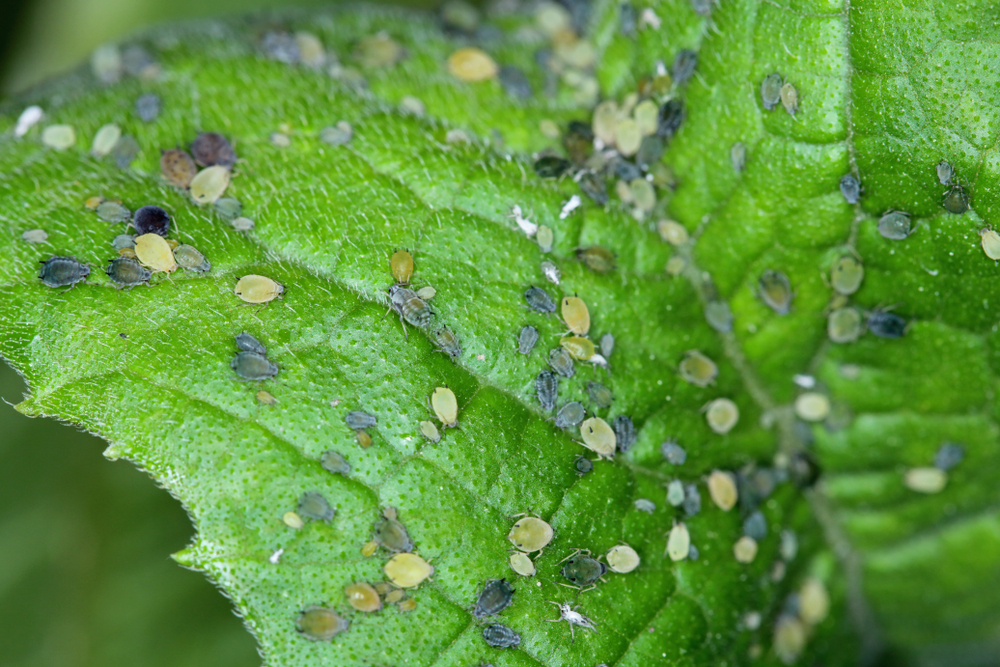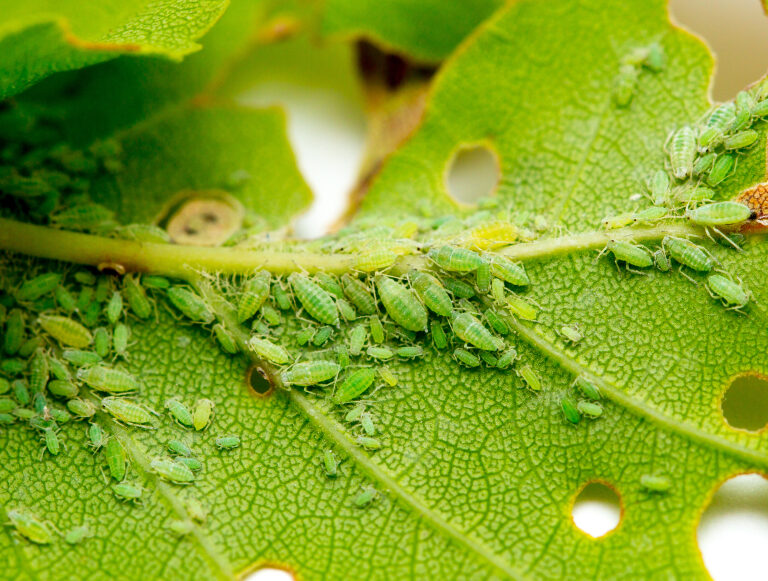Aphids are rude intruders who seek to destroy your garden. The worst part is that they can ruin several months of your hard work in just a couple of weeks.
You must keep an eye out for them and kill them as soon as you spot just one. If you’re unsure how to do that, that’s what we’re here for. Getting rid of them requires persistence but it’s pretty easy, and preventing them is even easier.
How to Spot Aphids
You have to know what to look for before you’re ever able to start treating them. Plants can host a variety of insects that look similar, which makes pest control seem overwhelming.
Look for Little Bugs
Aphids are tiny bugs that you may not see right away. They’re typically found on the underside of leaves in clusters. Aphids are typically green, although some species will look brown, white, black, or yellow. The eggs are even tinier, and are white.

A small cluster of aphids can quickly turn into thousands since one aphid can lay up to 60 eggs, and those eggs can mature in about a week. If six aphids are all laying 60 eggs, in a week you’ll have almost 400 new aphids, and in another week, you’ll have several thousand.
Sounds like a nightmare, right?
Pay Attention to Plants
Aphids kill plants by sucking out their sap. If you have a few aphids, the plant will die slowly. But, if the population booms, you’ll notice your plants dying at a much faster rate.
Signs that aphids are killing your plants include:
- Leaves turning yellow
- Leaves curling inward
- Plant is no longer growing
- Leaves look misshapen
Aphids are also capable of transmitting diseases between plants. If you noticed that one of your plants is diseased, and the disease is starting to spread despite its leaves not touching other plants, it’s probably a sign that aphids are traveling from plant to plant.
Look for Honeydew and Ants
If you see ants on your plants, you probably have aphids. Ants are farmers, and aphids are their cattle. It’s kind of cute, until they establish a ranch on your vegetable garden. As aphids feed on the plants, they secrete a substance that we call honeydew.
Ants love honeydew, so they hang around the aphids, protect them, and will even pet the aphids with their antennae to make them secrete more of the delicious honeydew. In some cases, ants will take aphid eggs to their nests to make sure they keep an aphid population available at all times.
Honeydew is a sticky substance that you’ll be able to notice on your plants. Once you see it, you can expect ants to show up soon to don their overalls and straw hats to begin cattle raising.
Natural Ways to Get Rid of Aphids
Once you’ve spotted aphids, it’s time to decide which method you’ll use to get rid of them. Think fast, because they’ve probably already laid their eggs.
Deploy Ladybugs
Ladybugs are a gardener’s best friend; they don’t hurt plants, and they eradicate aphids. In the spring, plant flowers around your vegetables to attract ladybugs to your garden. When aphids show up, you’ll hopefully already have a local population of ladybugs that will be able to take care of your problem.
If you don’t have ladybugs nearby, you can buy them online or maybe from a local breeder. If someone you know has a ladybug infestation, offer to scoop them into a container so you can use them as allies. It’s better to use local species since foreign species may not be satisfied with the plants that are available.
The downside to buying ladybugs to release is that they might not stick around. They could easily fly away as soon as you release them if the aphid population doesn’t catch their attention.
Use Soapy Water
Soapy water is a simple way to kill aphids. Use 2 tablespoons of dish soap per gallon of water and spray it on the aphids. A small amount of soap won’t hurt your plants, but there is such a thing as too much. Luckily, it doesn’t take much to kill an aphid.
You should make a gallon of soapy water because you’ll need to apply it every two days for a few weeks. Spray every single plant that has aphids, and be sure to check all the plants when you spray since aphids will travel.
Pick Them off by Hand
It’s not the most enjoyable method, but it’s effective. Wearing a glove, you can scrape off aphids with your hand and deposit them into a container of soapy water. You can add a bit more soap to this container as long as you don’t give it to your plants. The aphids will drown or be killed by the soap. You can also scrape off aphid eggs.
This method is only effective for small populations. If you only see a single cluster of eggs or aphids in your garden, removing them and killing them with this method will stop an infestation from breaking out.
Insecticide to Get Rid of Aphids
Organic gardening ensures that your food will be safe to eat, but it doesn’t ensure that you’ll be pest-free. If you don’t mind using chemicals around your plants, or you’re desperate enough to defy your organic gardening efforts, pesticides can be a simple solution that won’t take up too much of your time.
Contact Insecticides
Contact insecticides come in the forms of dust, liquid spray, or aerosol spray. They’re meant to be applied directly to the aphids and will kill them on contact.
These chemicals generally aren’t safe for people, so you should protect your skin and cover your eyes, nose, and mouth when applying them. Read the labels carefully to make sure that they’ll be safe for the plants.
These products can be bought online or in your local hardware store.
Nervous System Insecticides
These insecticides kill aphids by causing their nervous system to stop working. This can prevent them from breathing and will kill them. A common insecticide that does this is malathion.
Some of these sprays aren’t safe for plants, so you’ll need to read the label and make sure you get something that will work with your plants.
A Note About Chemicals
The chemicals used in insecticides are meant to kill insects, which means they’re inherently harmful to humans, pets, and plants, too.
Read the labels on insecticide packages from start to finish to make sure you use the product safely. It’s illegal to use these products in ways that go against the label.
How to Prevent Future Outbreaks
Eradicating the current population doesn’t mean you’ll never see them again. A new batch of them will show up, but you can deter them and prevent them with a few simple steps.
Neem Oil
Neem oil comes from an evergreen tree in India. It has a variety of uses in cosmetics but is commonly used by gardeners as a form of pest control. To use it against aphids, apply it to the leaves and stems of all the plants. It will repel them and won’t cause any harm to the plants.
Neem oil isn’t known to be dangerous to animals, worms, birds, or beneficial pollinators, but it can be a skin irritant for humans.
Diatomaceous Earth
Diatomaceous earth, or DE, is probably one of the best ways to get rid of pests. It’s a white powder made from fossilized algae that’s mined from the earth. Sprinkle on the soil around your plants, and it will kill any insects that walk on it.
The powder will cut the exoskeletons of the bugs which will cause them to lose moisture and eventually die from dehydration. It’s a slower form of pest control, but by the time aphids get to the leaves, they’ll be close to death.
DE can harm beneficial insects, like bees and ladybugs, so never apply it directly to leaves and flowers. Placing it on the soil or mixing it into the soil will minimize the damage to these insects.
Plant Garlic and Onions
Aphids hate the scent of garlic and onions. Growing these plants around your other plants can reduce the number of aphids you see in your garden. You’ll also get delicious food when it’s ready to harvest, so it’s a double win for you.
Final Thoughts
Aphids are a nuisance in the garden that can cause a ton of damage. Fortunately, there are several options you can use to get rid of them and you can even prevent them, too.
Try using natural methods first since they’re the safest, but sometimes a little pesticides go a long way and they can be worth using.
